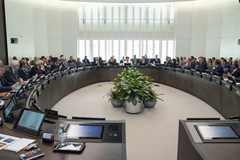
Nigeria has been granted a loan of US$ 3.4 billion to help the country stabilize its economy following the outbreak of covid-19 pandemic which has impacted the much of the world’s economy. Nigeria’s economy is noted to for facing a most dire economic downturn as a result of the collapse of the oil price.
Nigeria’s economy is a near mono-revenue-generating country that dependent is dependent on oil sales to support her economy.

The IMF expressed its willingness to provide Nigeria with policy direction on how to mitigate the very poor state of its economy exacerbated by the copid-19 pandemic.
Following the executive meeting, the chairman, Mr. Mitsuhiro Furusawa, Deputy Managing Director and Acting Chair, issued the following statement:

“The COVID-19 outbreak—magnified by the sharp fall in international oil prices and reduced global demand for oil products—is severely impacting economic activity in Nigeria. These shocks have created large external and financing needs for 2020. Additional declines in oil prices and more protracted containment measures would seriously affect the real and financial sectors and strain the country’s financing.
“The authorities’ immediate actions to respond to the crisis are welcome. The short-term focus on fiscal accommodation would allow for higher health spending and help alleviate the impact of the crisis on households and businesses. Steps taken toward a more unified and flexible exchange rate are also important and unification of the exchange rate should be expedited.
“Once the COVID-19 crisis passes, the focus should remain on medium-term macroeconomic stability, with revenue-based fiscal consolidation essential to keep Nigeria’s debt sustainable and create fiscal space for priority spending. Implementation of the reform priorities under the Economic Recovery and Growth Plan, particularly on power and governance, remains crucial to boost growth over the medium term.
“The emergency financing under the RFI will provide much needed liquidity support to respond to the urgent BOP needs. Additional assistance from development partners will be required to support the government’s efforts and close the large financing gap. The implementation of proper governance arrangements—including through the publication and independent audit of crisis-mitigating spending and procurement processes—is crucial to ensure emergency funds are used for their intended purposes.”
